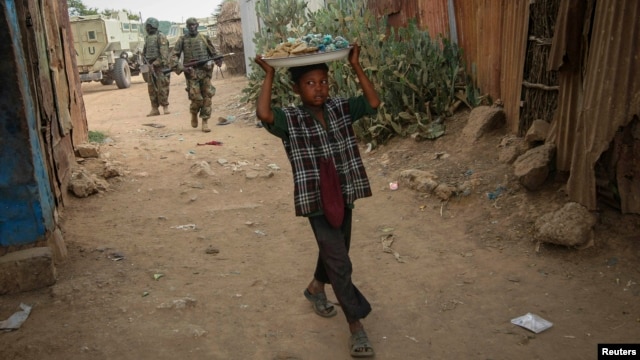
Friday, February 08, 2013
Lisa Schlein

A Somali boy carries a tray of nuts and snacks on top of his head as he walks near a market place in the town of Jawhar in Middle Shabelle region, north of the Somali capital Mogadishu, December 11, 2012.
The World Food Program reports the situation in Somalia is somewhat better now than it was in August 2011, when the country was struggling with conflict and drought. Though the number of those in need has dropped by more than half, WFP says the situation remains critical, especially in the south.
It is for this reason that WFP says it is particularly happy to be able to work again in the port city of Kismayo. This will be the first time in over four years that the agency will have access to this former stronghold of al-Shabab militants.
The Islamists, which held the population of southern Somalia virtually hostage for three years, barred the United Nations and other humanitarian agencies from entering the region and providing assistance.
WFP spokeswoman Elizabeth Byrs said a rapid food security and nutrition assessment carried out in Kismayo shows the severity of the situation there.“We found that half of the families of the households surveyed in Kismayo were food insecure and nearly 24 percent of children in Kismayo under the age of five were malnourished. So, the population has suffered from the lack of assistance," she said. "From the withdrawal of aid agencies and NGO’s.”
Byrs says WFP already has begun programs to assist people in Kismayo, with a special emphasis on children under five and lactating mothers. One program she says provides daily hot meals to people in need of emergency assistance.
She says WFP is shifting from emergency assistance toward programs that help the most vulnerable become more resilient. She says it is important they have the means to cope with natural disasters, such as drought and floods.
“We do this by helping communities build assets to strengthen local livelihoods, such as building reservoirs, wells, building roads, reinforcing social safety nets including, of course, nutrition programs for mothers and very young children. Also, we provide school meals,” Byrs explained.
Byrs says WFP will be closely monitoring these programs to make sure they are working. She says people in Somalia remain extremely vulnerable and anything could easily push them back into a crisis mode.
WFP is appealing for $57 million to carry out its humanitarian operation over the next six months.